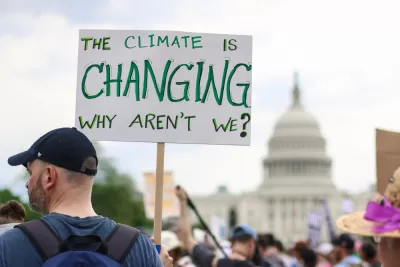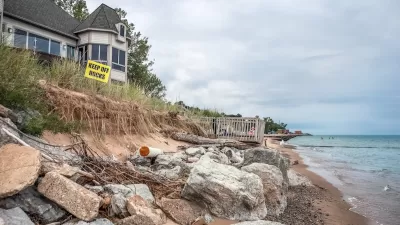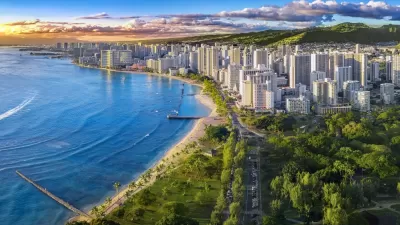A new U.N. report urges cities to upgrade their infrastructure to bolster climate resilience and build more sustainable, climate-friendly places.

In a piece on Wired, Matt Simon highlights the role of cities in the fight against climate change as laid out in a recent U.N. Intergovernmental Panel on Climate Change report.
The report presents opportunities along with challenges, notes coauthor William Solecki, of the City University of New York’s Hunter College, adding, "We recognize the world is very rapidly urbanizing—up to 70 percent of the world's population by 2050 will live in cities."
While urban agglomerations can lead to more deadly disasters that affect more people at once, "the good news is that cities could be designed so much better than they are now." In fact, "There's really opportunities to upgrade our infrastructure in a way that both addresses long-standing inequities and also invests in climate resilience," according to Rachel Cleetus, policy director of the Climate and Energy Program at the Union of Concerned Scientists and a report coauthor.
As Simon notes, the report recommends what it calls 'climate resilient development,' a set of processes that "link scientific, Indigenous, local, practitioner and other forms of knowledge" and "are more effective and sustainable because they are locally appropriate and lead to more legitimate, relevant and effective actions."
The report highlights the importance of local buy-in and combining strategies that adapt cities to the inevitable effects of climate change with policies that reduce emissions to slow future damage and protect vulnerable communities.
FULL STORY: Cities Are Unlikely Yet Powerful Weapons to Fight Climate Change

Study: Maui’s Plan to Convert Vacation Rentals to Long-Term Housing Could Cause Nearly $1 Billion Economic Loss
The plan would reduce visitor accommodation by 25,% resulting in 1,900 jobs lost.

North Texas Transit Leaders Tout Benefits of TOD for Growing Region
At a summit focused on transit-oriented development, policymakers discussed how North Texas’ expanded light rail system can serve as a tool for economic growth.

Using Old Oil and Gas Wells for Green Energy Storage
Penn State researchers have found that repurposing abandoned oil and gas wells for geothermal-assisted compressed-air energy storage can boost efficiency, reduce environmental risks, and support clean energy and job transitions.

Santa Barbara Could Build Housing on County Land
County supervisors moved forward a proposal to build workforce housing on two county-owned parcels.

San Mateo Formally Opposes Freeway Project
The city council will send a letter to Caltrans urging the agency to reconsider a plan to expand the 101 through the city of San Mateo.

A Bronx Community Fights to Have its Voice Heard
After organizing and giving input for decades, the community around the Kingsbridge Armory might actually see it redeveloped — and they want to continue to have a say in how it goes.
Urban Design for Planners 1: Software Tools
This six-course series explores essential urban design concepts using open source software and equips planners with the tools they need to participate fully in the urban design process.
Planning for Universal Design
Learn the tools for implementing Universal Design in planning regulations.
Ascent Environmental
Borough of Carlisle
Institute for Housing and Urban Development Studies (IHS)
City of Grandview
Harvard GSD Executive Education
Toledo-Lucas County Plan Commissions
Salt Lake City
NYU Wagner Graduate School of Public Service





























